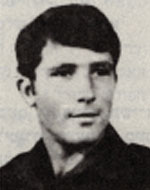Alan, son of Lucille and Joseph, was born on February 16, 1951. In Los Angeles, the son of a traditional Jewish family, he grew up surrounded by his parents at Beverly Hills, And then went to a regular high school in Los Angeles, and Alan grew up to be a sensitive and ambitious boy in an environment that gave him love and abundance, seeking his Jewish identity and when he was eighteen Came to Israel in the wake of the Six-Day War, succeeded in convincing his parents of his intentions and in May 1969 he immigrated to Eretz Israel and was sent to Ulpan in Kibbutz Hazorea, quiet, introverted and somewhat shy. In the kibbutz they knew him all because of his great love for the children and his love for animals, he played with the children, taught them to play baseball, and in every moment of leisure attracted them to the game and to the frenzy. On the lawn Alan liked to join any prank, any trip, or swim, without hesitation and without notice, handsome, fair-haired and blue-eyed, and everyone remembers him as an American who brought something different and fresh to the kibbutz. Succeeded. He loved music and enjoyed the music of the clarinet, although he never played for his friends, but only for pleasure. Alan was drafted into the IDF in the middle of August 1970. It was difficult for him to integrate into a military framework in a new country, among people who spoke an easy language for absorption, as a person with a free and liberated spirit could not adapt to the framework. The first period, after which he also went to visit his parents in Los Angeles, decided to go to an officers’ course, successfully completing an officer’s course and artillery officer’s course, and was the first immigrant from the United States to finish an officer’s course so soon after he immigrated Before completing his mandatory service, extended his service in the IDF for another year. When the Yom Kippur War broke out, Allen served as an artillery officer on the southern front. In his letter dated October 15, 1973, he wrote to his parents: “This is the ninth day of the war … I do not know how long this letter will last until it reaches you, but I hope it will be fast, because I do not want you to worry me too much. To visit you in May when I finish my army service, which is strange, but now I feel as if I have achieved some kind of self-realization, and that’s why I came here a few years ago … ” On October 18, he was interviewed by US television reporter NBC. “I feel like an important part of the struggle for something of value … I do not think that there is a lot of value in the world … If there is any purpose that will interest a young person, especially if he is a Jew, this is the place … I do not like fighting, there is something here that needs to be done and I am more willing to do it. ” On the 19th of Tishrei 5740 (19.10.1973), Alan advanced with his unit towards the bridges that were established on the Suez Canal. His half-track was hit and he jumped on another half-track to return fire to the enemy, shooting at them from all sides. He was brought to rest at the military cemetery on Mount Herzl in Jerusalem and left behind his parents, two sisters and a brother, and was promoted to the rank of lieutenant in a letter to the bereaved family: “Your son served in my unit for about nine months And fell during the Yom Kippur War, when he tried to cross with the first forces the Suez Canal. All the days of his service in the unit, he was an officer in Battery A, accepted and loved by all the soldiers of the dike, and his fall was a very difficult loss for all of us …Alan was always a personal example and was among the commanders of the best teams and officers devoted to the unit. As one who never gave up, the smile did not leave his face even during difficult times, never bad for anyone – as a good and dedicated officer, Alan will be remembered forever among the soldiers of the unit. Kibbutz Hazorea published a booklet in his memory.
